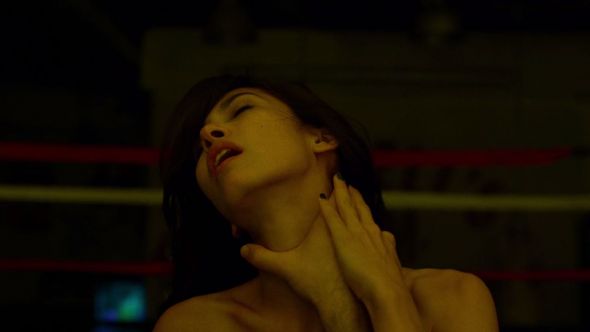In the Netflix Daredevil series, Matt Murdock first meets Elektra when he’s crashing a faculty party. He walks across a crowded floor in search of booze, as his progress is intercut with glimpses of Elektra: her expensive bracelets, her lips on a wineglass. The back and forth between his face and the bits of her suggests we are seeing her through him, his gaze creating an erotic, impressionistic, portrait: sex as vivisection.
The director of the episode, I believe, is Floria Sigismondi, but even though she’s a woman, the framing here is a perfect encapsulation of Laura Mulvey’s male gaze tropes. Mulvey argued that women onscreen are turned into individual body parts, which then freeze the narrative in fetishistic contemplation. Elektra, as body, interrupts Matt’s progress; she is framed through his gaze, even as she immobilizes that gaze.
The caveat here is that there is no gaze; Matt is blind; he can’t see Elektra.
You might think Matt’s blindness would undermine the male gaze. But instead it perfects it. His super-senses are more male gaze than the male gaze itself. His hearing, his smell, mean that he does not see her all at once, as a person, but rather as bits and pieces. Through his blindness, he knows her and possesses her more completely than if he were sighted—as he demonstrates at the scenes end, when he gets the better of her in a battle of wits, and leaves with her, future intercourse heavily telegraphed.
Ever Oedipus and/or Freud blindness has been associated with castration. Daredevil’s disability carries with it the threat of unmanliness. One could, perhaps, imagine a Daredevil series which thought through that stereotype, and which thought about the ways that disability questions the necessity, or the righteousness, or the centrality, of strength, competence, virility.
That’s not the Daredevil series we’ve got though. Instead, Elektra is aroused and excited when she learns that Matt isn’t really blind. She wants a man who can fight her, and whose disability is only a show. Matt, for his part, is thrilled that she has found out his secret; he babbles about how she really “knows” him, which means in part that she knows he’s not actually disabled. The two eventually fall out over whether Matt should murder (Elektra feels he should) but her obvious contempt for his disability is never an issue. As far as the show is concerned, it’s natural for Elektra to prefer a sighted man to a blind one, and Matt (who is blind) is pleased that she does.
Similarly, Matt’s ability to sense Elektra, and to frame her in his gaze which is not a gaze, works as a deliberate assertion that he is not castrated. His disability is filmed in such a way that it makes him fit even more firmly into the tropes of manliness. The most striking thing about the Daredevil series is its utter disinterest in ever giving us a Daredevil-eye view of the world; we do not experience the world as Daredevil does. Instead, Daredevil’s vision is the traditional vision of film. Blind men, the film assures us eagerly, see with the same manly eyes as ever.

